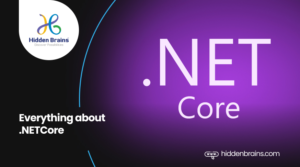Summary
.NET Core is Microsoft’s modern, open-source, cross-platform framework built to power web, desktop, mobile, cloud, and IoT applications. Unlike the classic .NET Framework, .NET Core runs on Windows, macOS, and Linux, offering performance, modularity, and flexibility. This blog dives into its history, key characteristics, use cases, and decision criteria, helping you understand when to choose .NET Core for your next project. You’ll also see how Hidden Brains supports businesses with .NET Core development. Whether you’re building scalable microservices or cross-platform apps, this guide gives you the essentials.
What is .NET Core and why is it considered a popular choice of framework for developing all kinds of applications?
Well Microsoft has explained it in a simple one line “.NET is a free, open-source and cross-platform framework that can be used for all type of app development”
Whether you are developing a mobile app, Windows app, cloud app, or Microservices app, .NET core is the platform on which developers can easily rely. It offers all the capabilities to make your app run on multiple operating systems and in various environments.
Now many of you are wondering whether .NET Core and .NET is the same thing.
The answer is NO!
While .NET Core is shelled out from the .NET framework and turned out as an extensive version with better features. So what is .NET core exactly mean and how it is different from the .NET framework?
The major difference between .NET core and .NET is- it is specifically used for Windows systems while .NET Core is compatible with a wide range of operating systems. Initiated by Microsoft- .NET Core developed over .NET framework to provide features to build robust and scalable applications.
Looking for top .NET development services? Hire us for expert solutions in .NET Core and unleash the full potential of your projects today!
While .Net is one of the top platforms for software development among other libraries and frameworks used by developers to build a software applications.
Let’s watch the quick video to know “Everything You Need to Know About .NET Core”
Everything You Need to Know About .NET Core
Let’s understand the concept of .NET Core in detail…
What is Dot Net Core?
.NET Core is like a toolbox from Microsoft that helps build modern, flexible apps. It works on different systems and supports many languages, making it great for web, windows, cloud, and mobile apps. But how did .NET Core is different and what modern things it offers for an app development
To know more about this, let’s gear back to the history…
History of .NET Core
Phase 1: Back in the early 2000s, Microsoft launched the .NET Framework, mainly for crafting Windows apps.
Phase 2: As more people used non-Windows systems, we needed a flexible framework to build apps that work on different platforms. That’s where the introduction of .NET Core happened in 2016).
Dot NET Core was introduced as a modern and cross-platform framework specially designed to be lightweight and scalable. This version of .NET can run on Windows, Linux, and macOS.
Phase 3: After that Microsoft realized the need of an improvised version and in November 2020, Microsoft unified the .NET ecosystem with the release of .NET 5. This version of .NET 5 has dropped “Core” from its name, signaling that it is the unified platform for all future .NET development.
So this is the short answer to all those who are looking for: What is .NET Core and What is .NET Core Used For. However, before you get straight to hire .NET developers in USA to kickstart your project, let’s evaluate the key highlights of the .NET Core.
Key Characteristics of .NET Core and Its Features
Knowing the evolving history of .NET core is quite tempting and interesting for businesses and instantly makes them fall for it. But it’s worthy taking a sneak peak of its features.
1) It’s Free and Open Source
The entire dotnet Core platform is free and open-source, giving expert developers a vast playground where they can develop futuristic enterprise-grade applications. You can easily find information about the .NET Core source code on GitHub. A huge number of active developers participate in .NET Core development with a drive to improve the existing features, add new features, and fix bugs and issues.
Currently, more than 60,000 developers and 3,700 companies are contributing to the .NET ecosystem.
2) .NET Core is Modern
Shifting away from older frameworks and functionalities, the .NET Core framework is built to solve today’s modern needs, some of them include being mobile-friendly, building it once and running it everywhere on all platforms, scalable, and high performance.
3) It is Cross-platform
The framework supports and runs on Windows, macOS, and Linux operating systems. It is also amazingly consistent across architecture including x64, x86, and ARM. You can import and use the same assemblies and libraries on multiple platforms.
.NET Core supports modern language constructs using C# version 8, like object-oriented and modular programming, generics, collections, lambdas, Language Integrated Query (LINQ), and asynchronous programming.

Dive into Next-Level Performance!
4) Speed
When compared to the .NET Framework and .NET Core 2.2 and previous versions, .NET Core 3.0, the latest version is superiorly fast. Also, it is faster compared to current server-side frameworks like Java Servlet and Node.js.
5) Lightweight and Friendly
You will find that the framework is extremely lightweight; it can be included in your app or installed side-by-side user, machine-wide, or on a server. You can deploy .NET Core in Docker containers.
Additionally, the .NET Core framework is aptly compatible with .NET Framework, Xamarin, and Mono, via .NET Standard. You will also get support while working with other popular Web frameworks and libraries like React, Angular, and JavaScript.
Read More: 20+ Top Web Development Trends in 2024
What is .Net core used for?
Since .NET Core is a general-purpose software development framework, it easily allows developers to build many software including Web, Desktop, Mobile, Cloud, Gaming, IoT, etc.
So what type of applications built with .NET Core are supported on Windows, Linux, and macOS.
- Web Applications:- The core component of .NET Core diaspora is ASP.NET Core, a framework good for building web pages. ASP.NET Core comes from the lineage of MVC architecture and provides common libraries to build the Web. The biggest example you can refer to for web apps is StackOverFlow.
- Mobile applications:- With Xamarin offering a set of tools and libraries for building cross-platform mobile apps using C#, developers can build native apps for iOS, Android, Windows, and macOS on a shared .NET codebase with seamless functionality.
- Desktop Applications:- You get a myriad of tools and frameworks with .NET Core to build desktop applications. If you want to start building desktop applications, Windows Forms, WPF, UWP, and Xamarin are four major pillars for you. Visual Studio Code is one of the top examples of desktop applications that use .NET Core. It is a popular code editor platform for developers.
- Cloud Apps:- With cloud gaining traction across the IT sector, the demand for cloud apps has also surged. Azure provides support for different types of cloud apps and Netflix is the biggest example of it.
- Internet of Things:- The most popular domain across information technology today is IoT. You can get .NET Core support for IoT development via the UWP framework for IoT devices running Windows 10 IoT Core.
- Games:- You can use C# and UWP are used to build games for mobile, desktop, console, TV, VR, AR, and the Web. With support from Unity, one can make astounding games.
Read more: 45+ Top Web App Development Ideas in 2024
When To Choose .NET Core?
Choosing .NET Core for your development projects depends on several factors. Here are situations where selecting .NET Core may be advantageous:
- Cross-Platform Needs: Want your app on various systems? .NET Core runs on Windows, Linux, Android, iOS, and MacOS.
- Microservices Approach: Perfect for independent microservices development due to its lightweight, modular structure.
- High Performance: Ideal for demanding applications like web APIs, microservices, and servers, thanks to its enhanced performance.
- Containerization Plans: If you’re thinking of using Docker or similar tech, .NET Core is designed for easy container deployment and scaling.
- Cloud-Native Focus: Great for cloud-native app development, seamlessly integrating with platforms like Microsoft Azure. All you need is to hire web developers in USA to build cloud-native apps.
- Modern Practices: Embrace modern development – NET Core supports the latest features, has a modular design, and aligns with current development tools.
- Open-Source Collaboration: Prioritize open-source? .NET Core encourages community collaboration and contributions.
- Tech Integration: Need to work with AI, machine learning, or IoT? .NET Core supports these technologies through various libraries and frameworks.
- Web Development: Ideal for modern and scalable web applications, making it a solid choice for web development.
Always weigh your project’s specific needs, target platforms, and your team’s expertise when deciding on .NET Core.
How Can Hidden Brains Help You Build An App Using .NET Core Framework?
Hidden Brains is a Microsoft Certified Partner, so you can expect specialized .Net Core development services which is the open-source version of .NET, that runs on macOS, Linux, and Windows.
Instead of implementing the standard one-size-fits-all development strategy, our team of .NET Core experts analyzes to design, implementation, testing, and integration of systems. Our team has 50+ Microsoft-certified professionals with a proven track record of delivering 6000+ projects successfully across 10+ industries. Our ASP .Net core application development services include ASP .NET Core web application, ASP .NET Core 3rd party integration, Cloud application development, and many more.
For one of our clients, we have developed a Custom-made Cloud-based real-time communication app called Medichat that solves the pain of 100+ clinics, keeping the patient’s data confidential and integrity in place using all the advanced frameworks and libraries.
Here are the major issues that we have taken under consideration while developing an app:
- High cost of maintaining the existing systems that were made for large healthcare providers.
- The internal stress of keeping a track record of staff and their activities.
- Missed opportunities when using the wrong extensions to save the voice mails.
- Lack of knowledge and complex features to access existing applications.
After deeply evaluating our client’s challenges, we have built an app solution that ensures document security, Live chat security HIPAA Compliance, video chat, and more. To get on the full case study of Medichat, can click here.
Frequently Asked Questions
What is .Net core used for?
It is used for the development of server applications that function on Mac, Windows, and Linux. Presently it does not support the development of desktop applications with the help of a user interface. .Net core framework facilitates developers to write applications and libraries in C#, F#, and VB.NET in both the runtimes.
Why is.Net Core better than .Net?
Being a new open-source, cross-platform framework, .Net core is used for application building for different operating systems like Mac, Windows, and Linux. And is much faster than .Net. It is a scalable system and is high-performance without the UI.
What does .Net Core mean?
.Net core framework is a better version of the .Net framework. It is free, open-source and a platform with general-purpose development. .Net Core is maintained by Microsoft. This cross-platform framework runs on Linux operating systems, macOS, and Windows.
What things are included in .Net core?
The ASP .Net core runtime offers important services for internet-connected apps like IoT apps, web apps, and mobile backends. Whereas the desktop runtime offers services for the Windows desktop apps that comprise WPF and Windows Forms.
What is the future of .Net core?
To be precise, the .Net Core framework is the future of .Net. Being the next version, this single unified platform has some big-time high-level libraries and APIs, run-time components, low-level libraries, compilers, type systems, tools, and languages.
Conclusion
Modern-day technology demands modern frameworks and mature programming languages. A few applications, websites, and microservices require a powerful and experienced framework supporting them in the background. This blog has given you in-depth information about what is .NET Core and what is .NET Core used for.
But somewhere many of you got confused that to make use of .NET Core in your projects. Well, that’s where you need to hire a web developer in USA with .NET Core expertise. The experts will evaluate your project needs and help you get a perfect solution.
For more details, you can contact us.































































































![Sales & Distribution [Oil & Gas] Sales & Distribution [Oil & Gas]](https://www.hiddenbrains.com/blog/wp-content/themes/blankslate/assets/images/sales_and_distribution-icon.74d08193.svg)

![Fluid Terminal Management [Oil & Gas] Fluid Terminal Management [Oil & Gas]](https://www.hiddenbrains.com/blog/wp-content/themes/blankslate/assets/images/fluid_terminal_management-icon.4b3a27a4.svg)































![Sales & Distribution [Oil & Gas] Sales & Distribution [Oil & Gas]](https://www.hiddenbrains.com/blog/wp-content/themes/blankslate/assets/images/sales_and_distribution-icon.74d08193.svg?1.0.0)
![Fluid Terminal Management [Oil & Gas] Fluid Terminal Management [Oil & Gas]](https://www.hiddenbrains.com/blog/wp-content/themes/blankslate/assets/images/fluid_terminal_management-icon.4b3a27a4.svg?1.0.0)
























































































































































































